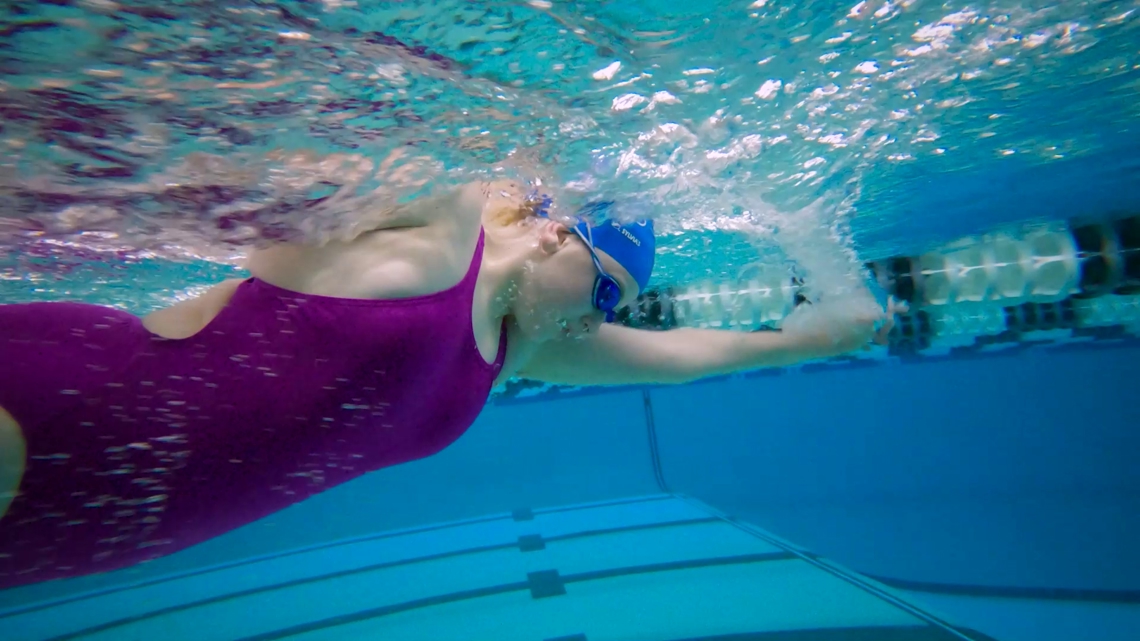The swim team provides a space for athletes with disabilities to compete, connect and socialize with one another.
SEATTLE — The nation’s first independent swim team for athletes with physical disabilities was launched right here in Washington state, and it remains the only team of its kind in the Seattle area and the entire Pacific Northwest.
Justin Fleming is a graduate of the school and current coach of the program, and swimming has been his lifelong passion. Fleming’s disability is called proximal femoral deficiency, which he describes as similar to that of an above-knee amputee.
“I think one of the most inclusive things about swimming is the water and the reduction of gravity, which is something that a lot of people with physical disabilities really struggle with,” Fleming says. “In the water, the rules are different because you’re buoyant, which really helps most people.”
The pinnacle of Fleming’s career was the 2004 Athens Paralympics, an intense experience that robbed him of focus for years, and afterwards he found it hard to adjust to a life where one of his biggest goals had been achieved.
“It’s a very depressing time after competing in the Olympics or Paralympics,” Fleming said. “You’ve been preparing for at least four years and then it’s all over so it leaves a lot of people feeling lost, and I know I was too.”
Returning to coach his old swim team was a silver lining during a difficult time, and continues to be so today.
“Being able to come to Shadow Seals and be with my friends really brightens my week,” Fleming said.
Shadow Seals was founded in 1994 after former Seattle Children’s Hospital nurse Kiko Van Zandt met two wheelchair-bound patients who wanted to exercise. The team’s goal is to provide athletes with a competitive team environment, culture, mentorship, training and competition to achieve athletic and personal success.
Aspen Ashby, 16, is one of Fleming’s swimmers. Ashby has a form of cerebral palsy called unilateral dystonia, which affects her ability to control her left arm and leg. Ashby started swimming in 2019 and is on her high school swim team as well as a member of Shadow Seals.
“Being part of an all-disabled team and also being part of a team with able-bodied swimmers is really great because you can really challenge yourself,” they said.
Ashby said they were treated differently once it was discovered they had a disability – bullied by their peers and treated like kids by adults and teachers – but Shadow Shields has given them a platform where they can thrive just like other athletes.
“Everyone on the Shadow Shield team is so tolerant,” Ashby said. “I joined to be treated just like everyone else.”
Ashby said the coaches are skilled at adapting techniques and different strokes to suit each player’s ability, and they provide a platform for players with physical disabilities to connect and interact with each other.
“Some of the benefits of Shadow Seals actually go beyond the actual act of swimming, it’s just that athletes have a community of peers they can discuss things with,” Fleming said.
Michael Hatzenbeller, CEO of Probeil, a nonprofit that helps people with disabilities fulfill their life choices, said prejudice and stereotypes remain major barriers preventing people with disabilities from connecting with others and their communities.
“It’s not a nice feeling to be told, ‘Oh, you’re disabled,’ and be treated like a baby,” Ashby said.
Shadow Shields hosts an annual swim meet where swimmers from the club compete against mostly able-bodied swimmers.
“What I love most about the Marine Morrison tournament is watching the athletes realize what a great opportunity they have in front of them,” Fleming said.
Ashby said the event gives him and other swimmers an opportunity to push themselves beyond what they thought was possible, and having role models who have reached the pinnacle of their sport shows them anything is possible.
“Having Justin around who has a disability and has competed in the Paralympics makes me think, ‘Wow, maybe one day I can compete in the Paralympics,'” Ashby said.
Fleming said that when it comes to working with Shadow Seals, it’s important to show players what they can achieve.
“I’m not trying to change people, but I’m trying to be an example in terms of what can happen, because if you can see it, it’s easier to get there,” Fleming said.

